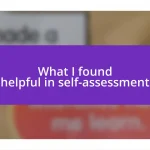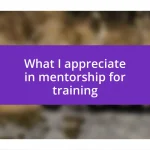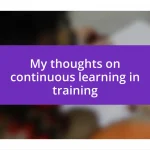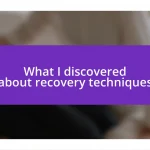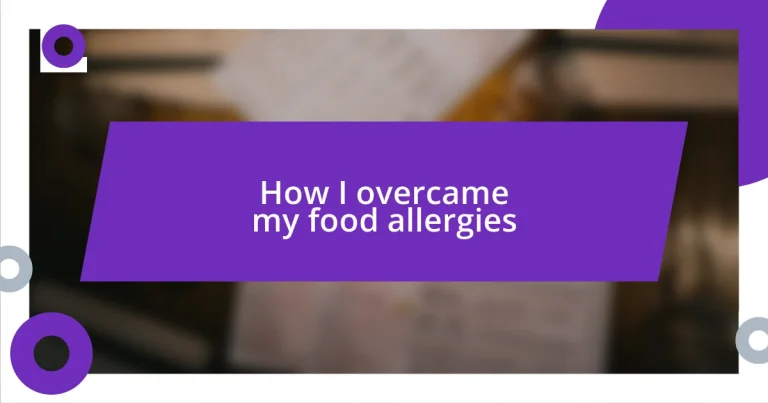Key takeaways:
- Identifying specific food allergies through careful tracking and professional testing provides clarity and enables safer eating choices.
- Seeking help from healthcare professionals, such as allergists and dietitians, offers essential guidance for managing allergies and maintaining nutritional balance.
- Building a supportive community and sharing experiences fosters a sense of belonging and empowers individuals to navigate the challenges of food allergies together.
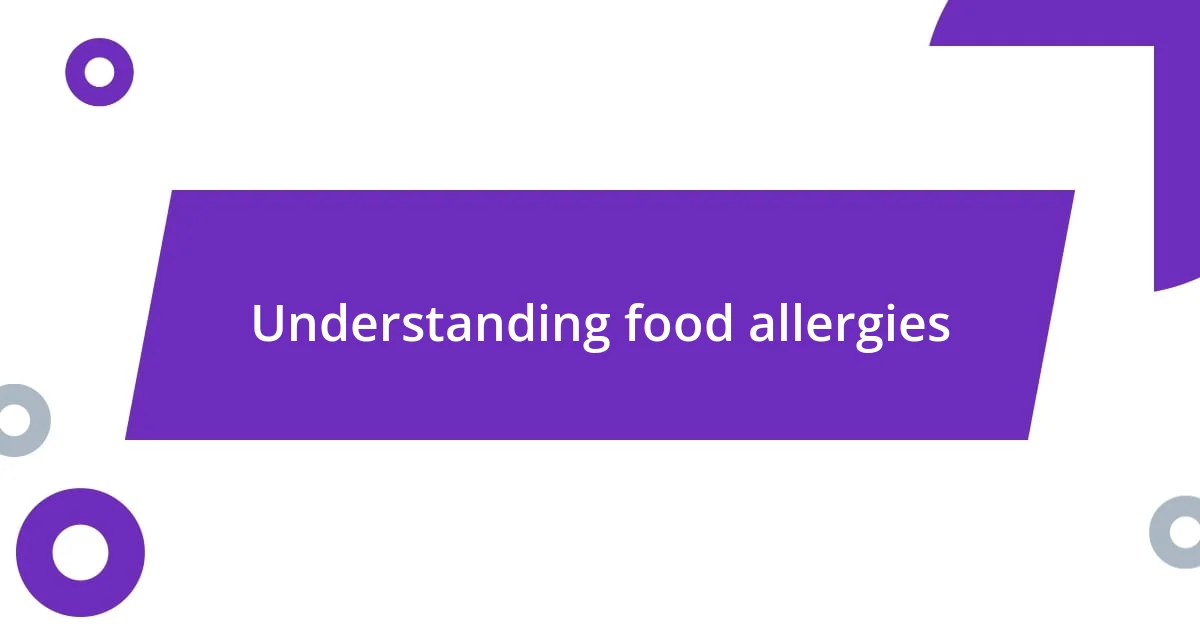
Understanding food allergies
Food allergies occur when the immune system mistakenly identifies a harmless substance as a threat. I remember the first time I encountered this: I had a simple peanut butter sandwich for lunch and within minutes, my throat began to swell. It’s a terrifying experience, realizing that your body is reacting so dramatically to something most people enjoy without a second thought.
Understanding food allergies is crucial because they can range from mild reactions, like hives, to severe anaphylaxis, which can be life-threatening. Can you imagine being in a situation where simply eating a favorite food could put your life at risk? I often felt a mix of anxiety and frustration at social gatherings, where I had to constantly scan the menu for potential allergens, feeling as though I was missing out on normal experiences.
Knowledge about common allergens like tree nuts, dairy, or shellfish can empower individuals to make safer choices. I remember taking a cooking class and feeling liberated when I learned how to substitute ingredients safely. It’s a journey of understanding that not only protects your health but also helps you enjoy food in a way that feels secure and fulfilling.
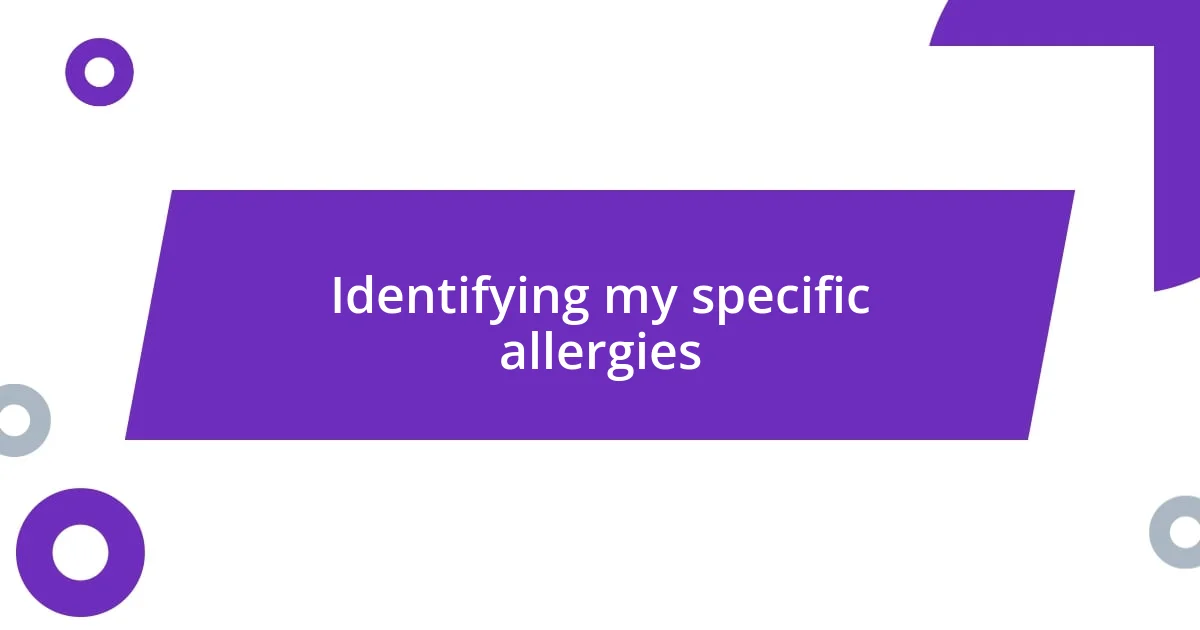
Identifying my specific allergies
Identifying my specific allergies was a pivotal moment in my journey. It became essential to keep a detailed food diary, recording everything I consumed and any reactions that followed. This not only helped me pinpoint allergens but also made me more aware of how my body reacted to different foods.
- Peanuts: Initial reaction led to a hospital visit.
- Shellfish: Severe hives after a birthday dinner.
- Dairy: Unpleasant digestive issues after ice cream.
- Wheat: Bloating and fatigue after sandwiches.
I felt a sense of relief when I could finally connect the dots, yet there was an underlying anxiety about the limitations this placed on my eating experiences. When I finally confirmed my allergies through testing, it felt both empowering and daunting, like now I had a clear path but also a heavy responsibility to navigate the world of food safely.
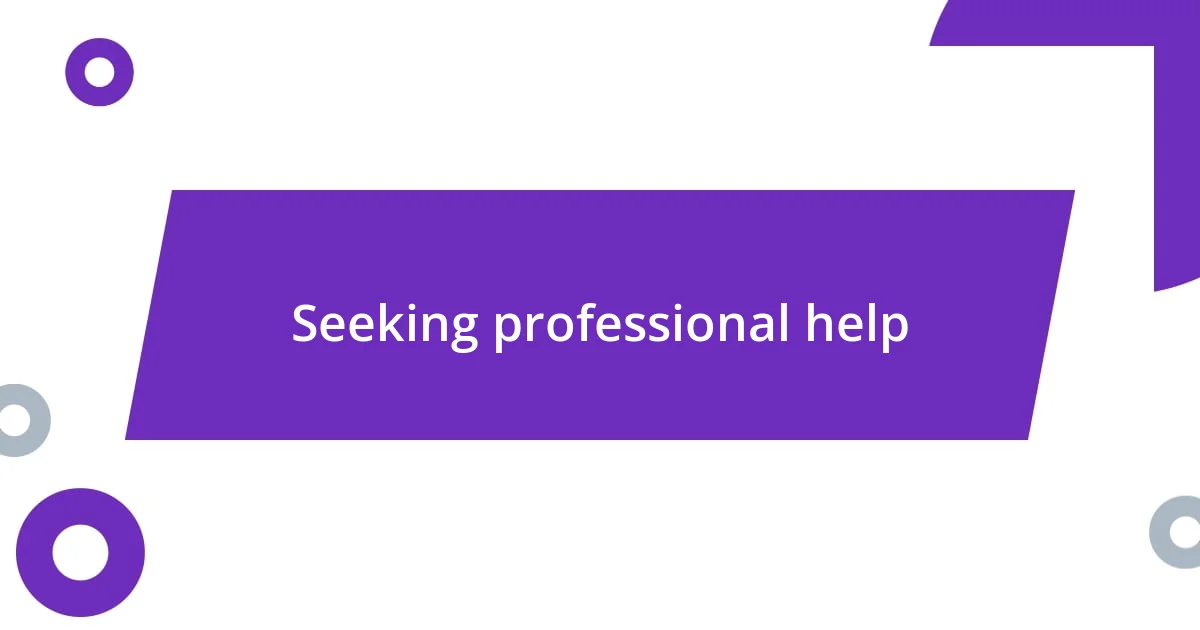
Seeking professional help
Seeking professional help can be a transformative step in managing food allergies. When I first consulted an allergist, it felt daunting but also refreshing. They provided me with a structured plan, clear guidelines, and testing that confirmed my allergies, relieving me of uncertainty. I remember sitting in that office, feeling a mix of anxiety and hope; it was the turning point I desperately needed.
Working with dietitians was another valuable experience for me. They helped me navigate meal planning, ensuring I met my nutritional needs while avoiding allergens. Initially, I was overwhelmed by the prospect of cooking without certain ingredients, but these professionals guided me through safe alternatives. I recall a session where we explored recipes together, and it was such a relief to realize that I could still enjoy delicious meals without compromising my health.
The ongoing support from healthcare providers has been invaluable. They offer not just medical advice but also emotional support, which is crucial when living with food allergies. Each time I faced anxiety about eating out or attending social events, I would reflect on their reassurance. It reminded me that I wasn’t alone in this journey, and that made all the difference.
| Type of Professional | Benefits |
|---|---|
| Allergist | Provides diagnosis, testing, and treatment options to manage allergies effectively. |
| Dietitian | Offers personalized meal planning and nutritional guidance to avoid allergens. |
| Support Groups | Creates a community for sharing experiences and coping strategies, reducing feelings of isolation. |
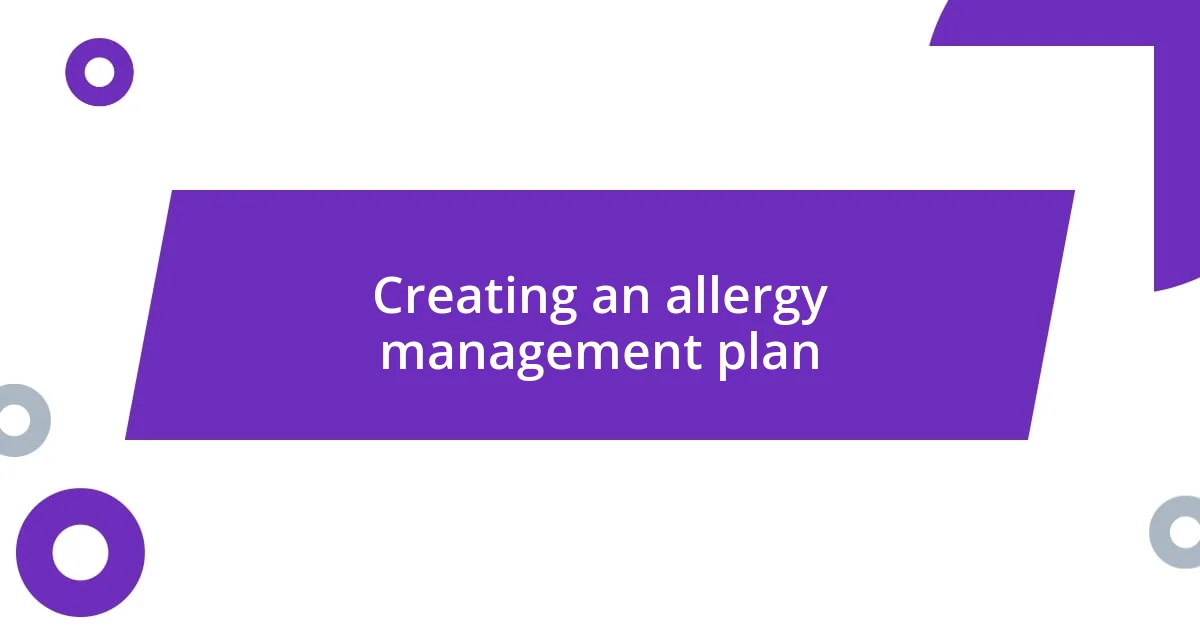
Creating an allergy management plan
Creating an allergy management plan involves a strategic approach to living with food allergies. From my experience, it’s crucial to establish clear protocols, like labeling foods meticulously and communicating allergies whenever I dine out. I remember the first time I handed a restaurant manager my allergy list; it felt a bit vulnerable yet empowered, knowing I was taking steps to protect myself.
One effective method I found is making a detailed shopping list before heading to the grocery store. This not only helps me avoid impulse buys but also ensures I stock up on allergy-friendly foods. Have you ever stood in the middle of the store, overwhelmed by options? I certainly have. Having that list allows me to focus, ensuring I bring home items that align with my allergy management plan.
Lastly, I believe that educating friends and family about my allergies has been fundamental. I recall a gathering where I explained my dietary restrictions, sharing my experiences openly. Their support turned what could have been a tense conversation into an opportunity for understanding and care. This not only fosters a safer environment for me but strengthens my relationships as well. How about you? Have you had similar conversations with those close to you? It’s amazing how these discussions can enhance our sense of safety and belonging.
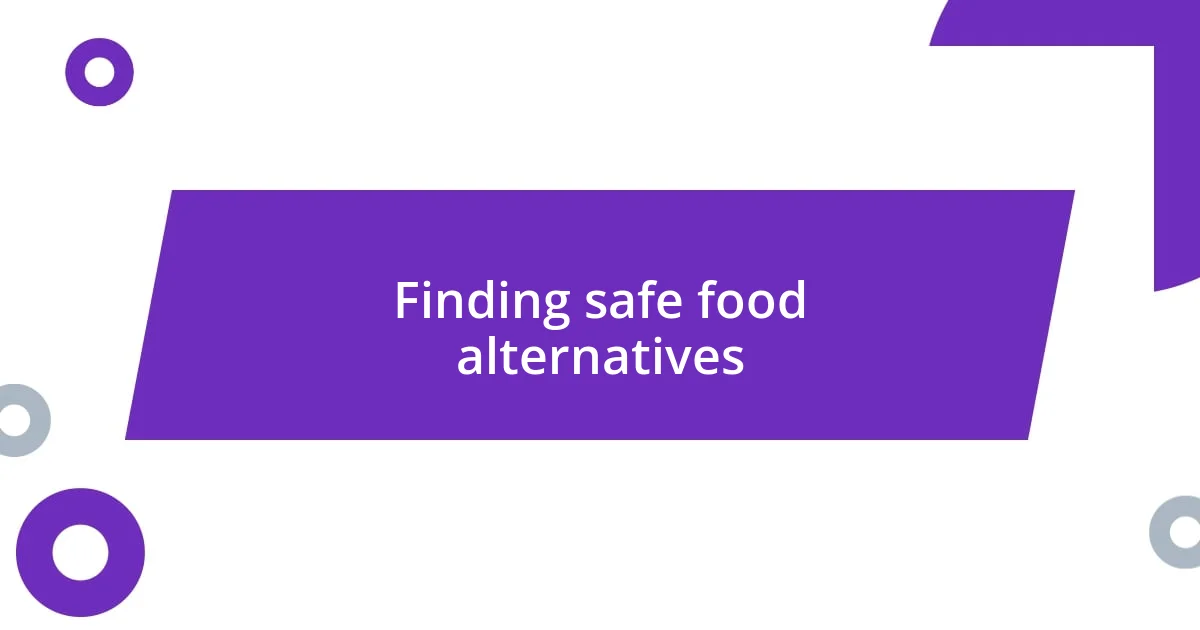
Finding safe food alternatives
Finding safe food alternatives can feel like navigating a maze at times. My experience taught me that reading labels is not just essential; it’s empowering. I recall grocery shopping for the first time after my diagnosis. Standing in the aisle, I diligently scanned every ingredient, feeling both determination and a bit of anxiety. It was a revelation to realize that I held the key to my own safety, ensuring every food item aligned with my health needs.
I also found comfort in exploring new foods. Initially, I felt limited by my allergies, but I discovered a world of alternatives I never considered before. For instance, I used to love baking, but after my diagnosis, I turned to gluten-free flours and egg substitutes like flaxseed meal. It felt like reclaiming a piece of my passion. Have you ever stumbled upon a new ingredient that sparked joy in your cooking? When I tried almond flour for the first time, it opened up a whole new realm of possibilities, turning what I thought would be loss into a culinary adventure.
Connecting with communities, both online and in person, has enriched my journey to find safe alternatives as well. Sharing tips with others in similar situations, I learned about brands I’d never heard of or recipes that transformed everyday meals. I remember a particular forum where someone posted a recipe that became a staple in my kitchen. It’s incredible how collaboration can lead to creativity and support in our food journeys. Isn’t it reassuring to know you’re not alone in this? Each interaction not only boosted my confidence but also reinforced the idea that together, we can overcome challenges and celebrate flavorful, safe meals.
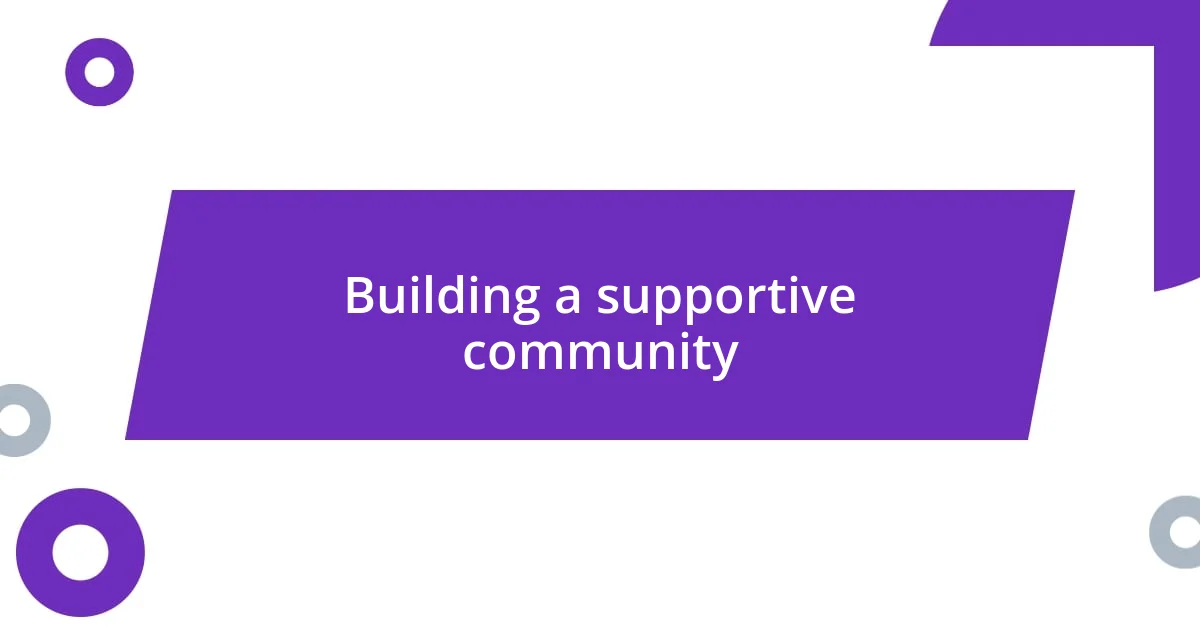
Building a supportive community
Building a supportive community around food allergies can make all the difference in navigating daily life. I remember initially feeling isolated, unsure if anyone else truly understood my struggles. That changed when I joined a local support group. Sharing my experiences with others who had similar stories was liberating. Have you ever felt the weight lift after sharing your struggles with someone who gets it? It was like finding a safe harbor amidst a storm.
When it comes to creating this community, I think it’s vital to engage with both online and offline platforms. For instance, I stumbled upon a Facebook group dedicated to allergy-friendly recipes. The first time someone complimented my homemade allergen-free cookies, I felt an overwhelming sense of belonging. Those small wins fueled my passion for cooking while reinforcing my commitment to a healthy lifestyle. Don’t you love how a simple compliment can spark motivation?
Another benefit I discovered in this supportive network is the shared knowledge. I’ve learned about new products or local restaurants that cater to food allergies through these conversations. Just last month, a friend from the group invited me to a new café that had a fully allergy-friendly menu. The joy of knowing I could eat there without worry made the outing special. These connections foster not just support, but also a sense of shared joy and discovery that celebrates life beyond allergies. Who knew that building a community could transform worry into excitement?
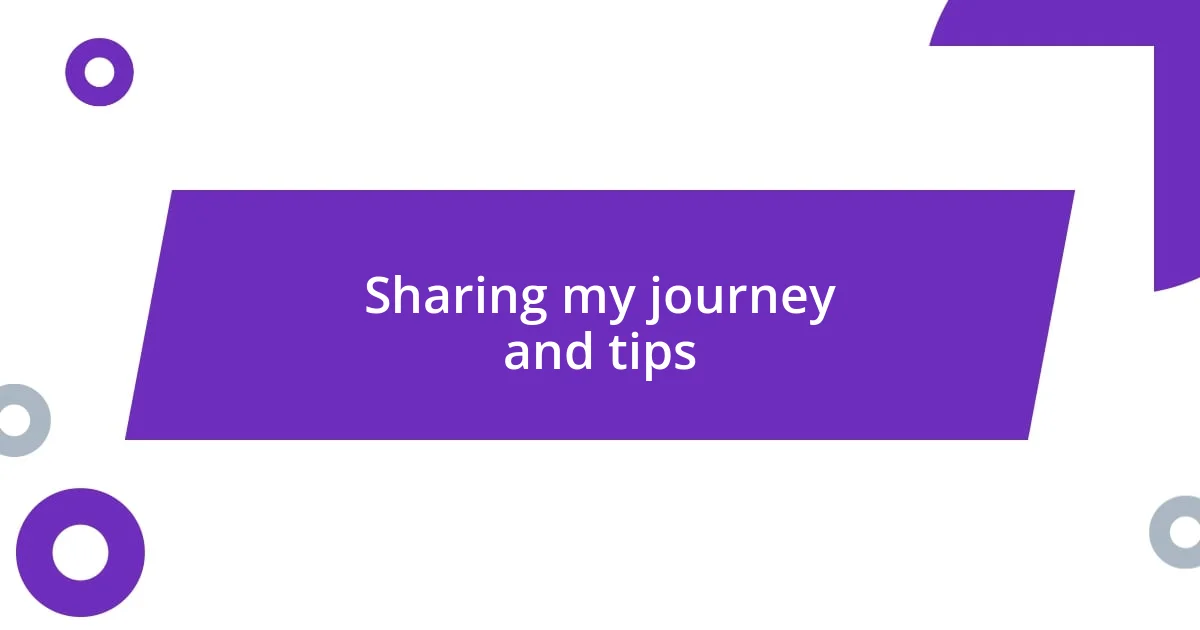
Sharing my journey and tips
Sharing my journey has been a mix of challenge and empowerment. I remember the first time someone asked me about my allergies at a dinner party. It felt daunting to explain while also feeling vulnerable. Yet, that conversation opened doors to understanding and connections. Have you ever realized that opening up can create bonds you never expected? It was in those moments that I began to appreciate how sharing my experiences not only helped me but also informed others about living with food allergies.
One of my favorite tips is to always keep a food journal. I started doing this as a way to track my reactions and safe foods. Surprisingly, it turned into a valuable resource for meal planning and experimenting with flavors. Looking back, I can see how jotting down my thoughts and findings helped me reflect on my journey. Do you ever find that writing down experiences helps clarify your thoughts? For me, it became a therapeutic way to process my emotions and celebrate the little victories, like discovering a delicious allergen-free snack.
I also encourage others to celebrate each milestone, no matter how small it seems. One time, I successfully hosted a dinner where every dish was allergy-friendly, and it felt like an enormous achievement. The sense of pride I felt when my friends enjoyed the meal without concerns was irreplaceable. Isn’t it amazing how overcoming challenges brings us unexpected joy? Embracing these moments not only enriches our journeys but also inspires those around us to be more mindful and supportive.





